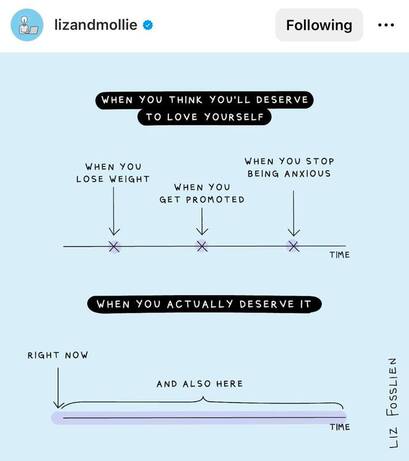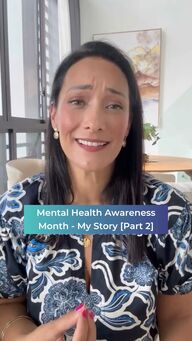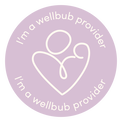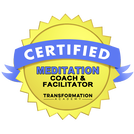AuthorJanel Briggs Categories
All
|
Back to Blog
Finding motivation, and achieving a work-life balance are two topics that come up a lot in my coaching, and truthfully, it’s taken me a long (very long!) time to work out the formula to this problem. I don’t know if you can relate to this, but I’ve always been the sort of person who is “ALL IN 100%” on something. In my corporate career if I was working on a deadline, I was ALL IN, meaning motivation for ANYTHING else in my personal life got pushed to the bottom of the list. Later, owning my own business in the early years, if I was working on a project, or studying, or exploring a new idea, I was ALL IN and my motivation for healthy habits like exercise, eating well or sleep got skewed. And if I was focusing on living, enjoying personal time OFF work, travelling (or at times battling my own mental health journey) - then I was completely checked out and unmotivated for work, exercise or ANYTHING else! If you are an ALL IN kind of person, I want you to know that this isn’t necessarily a bad thing. There is no doubt, you’re a go getter and have probably achieve great outcomes! Until… you hit burnout, or the all or nothing mindset becomes an issue and other areas of your life begin to fall apart. What I realised is that my mind was stuck believing these three things: 1. TO FEEL THE BENEFITS OF THE ELUSIVE WORK-LIFE BALANCE MEANT MY TIME HAD TO BE DIVIDED IN EQUAL PARTS.So, in order to be “in balance” I thought I had to dedicate 1/3 of my time to work, 1/3 of my time to family, 1/3 of my time to personal every week. However, I call this elusive as this is an unrealistic goal. Nothing in life happens in equal parts! As humans we are cyclical beings. Every year our planet runs in seasons – no matter where you live there is a cycle and a change of season. Some countries like here in Asia has 2 seasons (dry/wet), where the majority of the rest of the world has 4 distinct seasons. It's planetary. As women our body runs in hormonal cycles, which means our energy levels will always be in flux. Science tells us that there are certain times within our hormonal cycle that are better for productivity, exercise, and rest. It’s biological. When I started to understand and accept that life also runs in cycles and seasons, I began to feel more motivation and my mind expand with self-compassion. Consistent MOTIVATION is cultivated from self-compassion, NOT GUILT. In the cycle of life there will be months where work takes priority, and weeks where family takes priority, and then other times of the year when your personal and health goals will take priority. Ask yourself this: What is the most important thing you need to be focusing on - right now this week or month? Now, if I am in a season of increased work or study, then it’s I allow myself to create boundaries around my energy and reduce plans, commitments or tasks in other areas of life. Similar for family and person life. The key is to:
Flowing within the cycle you are in, instead of berating yourself for not doing X or achieving X - means you’ll be more motivated. 2. I DIDN’T UNDERSTAND HABIT CHANGE AND BELIEVED I WAS UNMOTIVATEDLet’s talk about habits for a minute. We learn habits through our conditioning, or from repeated past experiences. Our habits become imprinted as patterns or programs within our nervous system and brand, stored within the 95% unconscious part of our mind. Once a habit (good or bad) is formed it occurs outside of our conscious awareness, and will continue operating the same program until a time where you bring the habit into your conscious awareness, and create a shift or change. We all get so frustrated with ourselves and inflict so much guilt whenever trying to break “bad habits”. But, I think the main point we forget is that if habits are learned from repeated past experiences – then we have to CONSISTENTLY repeat the experience, until which time the unconscious mind re-programs a new pattern. The first step to habit change is always AWARENESS. Becoming consciously aware so that you can see these patterns and "wake yourself up" to a new way of living. As yourself this: What habits in your life today are working for you, or against you? 3. I COULDN’T LOVE, BE PROUD AND APPRECIATE MYSELF UNTIL I HAD ACHIEVED (XYZ) There is nothing more un-motivating that trash talking yourself. I call GUILT the swampland of the soul – guilt will always keep you STUCK in the place you are in. If your mind is on a loop of dishing out rude comments, telling you how bad you are and filled with negative self-talk – then you are ALWAYS going to feel unmotivated to do the THING. No matter what the THING is! Self-acceptance, and taking action are how you are going to stay motivated and find your version of work-life balance. As yourself this: Wherever you are right now, love yourself for the cycle you are in. Photo credit: @lizandmollie There is nothing more un-motivating that trash talking yourself. I call GUILT the swampland of the soul – guilt will always keep you STUCK in the place you are in. If your mind is on a loop of dishing out rude comments, telling you how bad you are and filled with negative self-talk – then you are ALWAYS going to feel unmotivated to do the THING. No matter what the THING is! Self-acceptance, and taking action are how you are going to stay motivated and find your version of work-life balance. As yourself this: Wherever you are right now, love yourself for the cycle you are in. And if you don’t know where to start to bring kinder thoughts into your life… begin with reading, writing or speaking positive affirmations every day. Powerful "I am" and affirming statements. This healthy mindset habit that is going to help you to feel more motivated and shift your mindset to having more positive thoughts. >> If you're new to this concept I have a free guide to help you get started >> DOWNLOAD MY FREE AFFIRMATIONS LIST HERE THIS is the one habit you want to start, and even better - it's completely free. As you navigate and redefine what work-life balance looks like for you personally take this newfound awareness and embrace the cycle or season you are in. Whenever you find yourself off chart, you can always reset. But, remember the foundation of your motivation will be built on self-compassion, not guilt.  About the Author: Janel Briggs is a NLP and Timeline Therapy Practitioner on a mission to support women across Australia and Singapore in healing their professional anxieties, insecurities and imposter syndrome to build unwavering confidence and self-belief. The goal is to level up your life and career by learning how to to live fearless and anxiety free! Connect with Janel on social media via Linkedin or Instagram.
0 Comments
read more
Back to Blog
Have you ever found yourself seeking happiness through external validation? For years, I placed my happiness in the hands of others, constantly thinking that if certain people or circumstances aligned in a certain way, then I would finally be happy. I would catch myself saying things like, "If my parents, sister, husband, son, boss, colleague, or X did THIS, then I would be happy." I tied my happiness to achieving good grades, receiving recognition at work, earning a promotion, or even reaching specific milestones in my first business. My joy was dependent on external factors and the validation they provided. The problem was, and what I've realised through Mindset Coaching, is that MY long term happiness is an internal job... I am the only one that can change it or make it happen. Yes, the external factors could give me a temporary hit of happiness, BUT they could never give lasting contentment. Here's why: 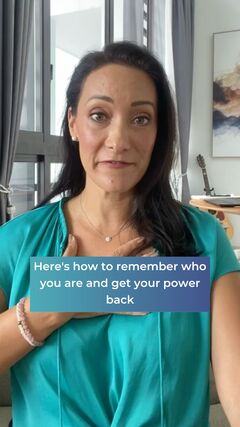 * We cannot control the external factors! Or other people's opinion of us * We cannot control how much or little someone loves us! Or HOW they specifically show us love The key was... I had to learn to know, love and accept MYSELF (all facets and parts of me) - in order to find my self-worth and experience a contentment that I never even knew existed. And the most amazing thing happened, when I stopped seeking external validation... I got my power back! In this video, I share the three crucial steps I took to break free from the cycle of seeking external validation and find true self-worth. Let me detail the 3 steps I took for you here: 1. Get clear on what is in your control and what isn'tI learned that I cannot control other people's actions, reactions, behaviours or even the way they love and treat me. I cannot control every single outcome, to every situation in my life. There will be uncertainty, there will be change, there will be things that do not always go my way. No matter how hard I work or try to make it different. I can only control what is within my circle - my mind, my body, my emotions and my behaviours. How I think, reaction and respond is up to me. 2. Start your day with a focus on self-careI started my day with a simple shift. In order to love myself fully and build self-worth I need to be the most important person in my world, my needs matter. My own self-care has to be a priority. I decided to wake up 15 mins earlier, to sit listening to a short 5 min guided meditation and I did 10 mins of journaling positive affirmations - something I had never done before! (If you are new to meditation I have a few to help get you started here) I spent 10 mins stretching and doing yoga, then ate a healthy nourishing breakfast and I listened to music while getting ready for work. I found this short 20-30mins of "me-time" first thing in the morning would calm and refocus my mind, before the chaos of the day began. When I filled my "needs cup" first, I found I wasn't looking to other people or external factors to fill my own needs. 3. Do one thing this week that brings you JOYI began a new habit where once a week I would do something that brough me joy - something just for me. Where I didn't have to do anything for anyone else. You see, I began to remember who I was outside of all the labels and hats I wore. Outside of the expectations, demands, stress and achievements of work. I started to love and reconnect to my inner child, the part of me that had gotten lost from putting all my happiness eggs outside my own basket. The part of me that was waiting for someone else to love, care and adore me, the way I wanted. It's an empowering feeling not waiting for someone to give you everything you need. I began to breathe easier and smile more often. Life felt less heavy and more enjoyable. I realise that it had to start with me, just like it has to start with you. And I am here to tell you - YOU can absolutely do it too. JB  About the Author: Janel Briggs is a NLP and Timeline Therapy Practitioner on a mission to support women across Australia and Singapore in healing their professional anxieties, insecurities and imposter syndrome to build unwavering confidence and self-belief. The goal is to level up your life and career by learning how to to live fearless and anxiety free! Connect with Janel on social media via Linkedin or Instagram.
Back to Blog
The most important day, is the day you decide your mental health is what matters most. Once you create this mindset shift, you'll find quite a few things get easier to manage:
I think so much of the time, as women, we feel like putting ourselves first is somehow selfish. But, it's not. It's actually healthy! How can you continue to give the world from an empty cup? I certainly couldn't. I was at the rock bottom of my priority list. My cup was so empty when I first recognised my mental health was a problem, I couldn't even muster the energy to get out of bed to feed my 3yo son. (Tap to listen to my story...) Your Mental Health Matters.My first (and biggest!) mindset shift was recognising that I was the only person who could actually change that situation. No one was coming to fix me. No one was coming to save me. I had to be the one who decided enough was enough, it was time for something to change. My wish is that I can empower you with 5 Simple Questions for Checking in on Your Mental Health so that your life doesn’t get to its lowest point, before you decide it’s time for something to change. Let's get into it: 1. How am I feeling emotionally right now? Checking in on your emotional state is an important step in assessing your mental health. Ask yourself: “How am I feeling in this moment?” “How long have I been feeling this way?” In times of external stress, we often deny our emotions, push them down and say, “I’ll deal with that later, I don’t have the time for this”. The funny thing about emotions is… we have to feel them, to heal them. Our emotions will continue to arise, in small or big ways, until we do. And at some stage they could even become super overwhelming - anxiety, anger, frustration, sadness – derailing you from every day life. 2. Am I taking care of my basic needs? Mental health is closely intertwined with our body’s wellbeing. Your body may begin to show symptoms of poor mental health before you even realise it consciously. Muscle tension, pain, feeling restless, headaches, insomnia, appetite changes are all key symptoms. Ask yourself: "Are you getting enough sleep, skipping meals, eating balanced meals, and engaging in regular exercise?" Neglecting your body’s basic needs can contribute to fatigue and the body’s stress. If you are not well slept and nourished, the mind has less resilience and finds it harder to process stress and emotions. 3. Am I managing stress effectively? Are you feeling overwhelmed and constantly under pressure?
Take a look at your coping mechanisms and self-care practices. Health stress management can be as simple as making time to move your body, meditate, journalling your thoughts or connecting with a friend – after a rough day. 4. How are my relationships influencing my mental health? Our relationships and the people in our life play a crucial role in our mental health. Ask yourself “Do you feel supported, valued, and respected?” “Do the people you spend time with uplift you, or drain you?” “Is this connection healthy for me right now”? Perhaps it’s time to create a healthy boundary and/or take some time away from the people who maybe feeling toxic right now, to recoup your energy. 5. Am I engaging in activities that bring me joy and fulfilment? When our external stress is at capacity, we forget about the simple act of doing things that bring us joy. If you are giving out all your energy to work, or other people’s problems – life is going to feel bleak really quickly. Ask yourself: “When was the last time I did something just for the fun of it?” “What is one thing that I could do, to bring more joy into my week?” If you’re looking for ideas for spending quality time with yourself, perhaps try one of these:
Remember, checking in on your mental health is an ongoing process. It’s essential to be honest with yourself and seek support if you notice any persistent concerns or challenges. There is no downside from ever working on your mindset or making some simple chances to your daily habits!  About the Author: Janel Briggs is a NLP and Timeline Therapy Practitioner on a mission to support women across Australia and Singapore in healing their professional anxieties, insecurities and imposter syndrome to build unwavering confidence and self-belief. The goal is to level up your life and career by learning how to to live fearless and anxiety free! Connect with Janel on social media via Linkedin or Instagram.
Back to Blog
May is Mental Health Awareness Month, aimed at raising awareness on the importance of opening conversations about mental health to help release the stigma. AND always a great time to prioritise our own mental health check-in. Most women I've been talking to share with me that it’s been a crazy start to 2023. Post-pandemic life is as busy as ever, we are back to rushing and packing as much as we can into every day, week, and month. Juggling work commitments, family, relationships, and social life. Keeping everything afloat and as best we can moving forward. With our constant connection to technology and the digital world, it can be difficult to fully take a break and give our minds the rest they need to recharge our energy. I recently went on a mini break, adventuring to the remote Pangkil Island in Indonesia, where I consciously decided to take a 4 day digital detox, for my mental health. I had noticed the signs of verging on the edge of burnout after an increasingly busy first quarter of work (and life!). Even coaches need "mental health check-ins!" too. I actually couldn't remember the last time I shut off completely from technology. I don't know if I've EVER done it for a longer period of time that 2 days since opening my first online business in 2014. That's when you know it’s definitely time for a digital detox. So, I told my clients I would be “offline”, left my laptop at home, and bit the bullet! I put my phone on airplane mode for 4 WHOLE days. And, WOW. All I can say is that is was TOTALLY FREEING to not be "ON" 24/7:
Imagine that! Now, I have to admit I already have strong boundaries with my phone and technology. But I found being completely OFFLINE was sooo good for my mental health that it was surprisingly HARD to come back to the social media and online world after 4 days! I wished it could have be longer. The health and wellness industry tells us that taking a digital detox can have many benefits for our mental and physical health:
WHEN was the last time you took a digital detox? When did you last unplug from the matrix and reboot your system??If it's been a while, and you’re feeling exhausted, BUT find the concept of 4 days off the grid super confronting... here are four baby steps you can take for a mini digital detox: 1) Create a boundary around when you pick up your phone in the morning and evening Is 6-7am when you first open your eyes to a blast of notifications and emails the best way to begin the day? Could you not look at notifications until 8am? Could you turn off your phone for the night at 8-9pm? 2) Set time limits on your social media apps (you'll find this option in settings!) 3) Move all of your social media/email apps OFF your home screen to 2-3 swipe pages across If you're the kind of person (like me!) who cannot stand seeing a red notification and has to urgently actioon THIS really helps. 4) Pop your phone on DND for 4, 6 or 12 hours By setting boundaries with technology, we can improve our mental and emotional well-being, reduce stress, and increase productivity. You may not find it easy at firs to step away from your devices, but it is beneficial for overall health and happiness! Any step you can take towards a digital detox is going to be powerful, it’s a tool that can help you disconnect from the digital world and reconnect with yourself, your thoughts, and be more present in your surroundings. The ultimate goal is to create a healthier balance in our lives, where we feel more present and energised! Try one or two and reach out to let me know the outcome? All the best, Janel
Back to Blog
A loss of identity and a crash of confidence can feel confronting, challenging and weird (especially when living overseas!). But it is possible to overcome it and get back to you. When I moved to Singapore from Melbourne in 2022, this was not my first rodeo at what they call becoming a “Trailing Spouse”. In 2007, my then boyfriend (now husband!) took a promotion within our company and we moved to the USA for 2 years, our first experience with the expat life. The experience was all parts incredible AND super challenging for me. At the time we were young and free! Dual income with zero responsibilities (remember that?!)- no kids, pets or mortgage! We both worked hard and played hard. We travelled EVERYWHERE, said yes to opportunities, and totally lived it up the experience. But not long after moving cracks began to appear in my mindset and mental health. Trailing spouse depression and identity loss is absolutely a thing, that I had no idea about. It wasn't in the brochure! As a fiercely independent woman of 30 I had NEVER before “given up my life” and put my own aspirations (and needs!) on hold for someone else … who at that time hadn’t even “put a ring on it” yet, as Queen B would say.
I had all the negative feelings, while watching my partner THRIVE in his work and his personal friendships. As you can imagine, this caused a massive strain in our relationship. I had lost my sense of identity, my value and self-worth. I realise now I had put all my happiness eggs in his basket in the relationship, expecting him to be EVERYTHING for me 24/7. I wanted him to fix me! And make me happy! Of course, that pressure was too much. Thankfully, this was a wake up call for me, a turning point where I decided I needed to work on me. I enrolled in University and went back to study, and I enlisted the help of my first NLP Coach and began the journey of understanding who I am, and what I wanted. SIGNS YOU MIGHT BE EXPERIENCING IDENTITY LOSS:
Fast forward 13 years marriage, one child, becoming a Mindset Coach myself and surviving a pandemic - we decide to move to Singapore last year for expat #2. Suffice to say this time I was more prepared. I spent my first few months noticing common themes throughout conversation I was having with other expat women here in Singapore. Pandemic burnout, overwhelm from moving to Asia without a support network, and anxiety arising from uncertainty and changes in working visas were recurring topics at every coffee meet up I joined. I began hearing echoes of the SAME feelings that I used to have. So many women who had moved for their partners career were suffering from an identity loss leaving them with too much time to think and worry about finances in the future. Although very grateful to be in Singapore for the expat experience, frustrations were felt around being unable to work and the fact that they put their life and career on hold to support their other half. This was the catalyst for me deciding to expand my Mindset Coaching business in Singapore. To be able to help these women who are feeling this sense of identity loss. To support those struggling with stress anxiety and ever growing “imposter syndrome” that come with big life changes. New Life Phase A loss of identity can happen at any time it does not relate to age or gender. Experts reveal that it can be triggered when a person enters a new life phase that makes them question their basic understanding of self. Major events such as changing careers, becoming apparent, ending a long-term relationship or moving to a new place can be a catalyst for those uncomfortable feelings where you just feel a bit, well, off. Research shows that relocation is the third most stressful life event possible. On top of this according to an InterNations survey, it's the partner of the expat with the job who tends to be more susceptible to mental health issues such as depression and anxiety and who is negatively affected by the move. Typically, this is because they:
(Tick, tick, tick from my experience way back in 2007!) In the beginning, the expat partner tends to focus on everyone else's happiness and getting the family settled as the priority. Once the transition is complete and all the tasks are done the questions begin to arise what do I do now? What is my purpose here? Where do I fit in? Who am I? Feelings of resentment, frustration, sadness, and hopelessness can set in. How to Shift Your Mindset The first step to navigate any big life change where you're feeling this sense of identity lost is begin to shift your mindset and try to see this journey, or new phase of your life, as an opportunity for personal growth, development and expansion. Here are 6 key points to help you get started: 1. Choose Acceptance Finding a place of acceptance for the circumstances you're in right now is key. Remembering that if your mind is too far in the past thinking about all the things that you don't have, you will continue to feel stuck. If your mind is too far in the future, you'll continue to feel anxious by the uncertainty. Both thought processes make it harder to find happiness and be in the present moment. Do note that acceptance doesn't necessarily mean that you have to surrender or like the situation, but having a willingness to accept your circumstances will release the resistance in the mind that creates undue stress. 2. Create Routine Routine serves as an anchor. Predictable, repetitive routines are calming and help reduce stress and anxiety. Formulating a weekly schedule can help you feel more motivated, organised and productive. How you begin and end your day matters. Are you feeding your mind with positive information and thoughts when you wake up? Are you feeding your body with nourishing food of movement during the day? Are you getting enough sleep? 3. Embrace Exploration Use this time to discover more about who you are:
4. Connect Recognise that you're not alone in your feelings. It can feel daunting to build interpersonal relationships in a new country but connecting with others and sharing your emotions can be very healing. 5. Catch Self-Doubt When negative or unhelpful thoughts creep into your mind, questioning your value or worth, practice catching the thought before it spirals. Understand that not every thought you think is factual, and feelings are not facts. The mind has a protection mechanism that wants to keep you safe. Instead of believing and listening to unkind self-doubt call it out by asking, “Where is the evidence to support this?” or “What is causing me to feel this way?”. 6. Reframe Your Language The words we choose have a positive or negative effect on our mindset. If you believe it's hard and say to yourself “This is hard, I hate this, I don't want this” then it will no doubt be harder for you. Whereas if you use more empowering words such as “I can do this, I can overcome this challenge” the mind will be more open to change and all the possibilities. This article was originally published ANZA (The Australia & New Zealand Association) Magazine Singapore, March 2023 edition (pg 34-35).  About the Author: Janel Briggs is a NLP and Timeline Therapy Practitioner on a mission to support women across Australia and Singapore in healing their professional anxieties, insecurities and imposter syndrome to build unwavering confidence and self-belief. The goal is to level up your life and career by learning how to to live fearless and anxiety free! Connect with Janel on social media via Linkedin or Instagram.
Back to Blog
 We all have limiting beliefs. They’re those pesky, damaging, and deeply ingrained thoughts that’ve been there for years. So long in fact that we’ve become convinced that they must be true. They’re not. Trust me. I’ve been there and come out the other side and want you too as well. So what are limiting beliefs? Where did them come from? And how can we get rid of them? Limiting beliefs reach across all aspects of your life. They’re thoughts or opinions that negatively impact your relationships, growth, and moving forward. They’re the little (or loud) voice saying… I’m not good enough, smart enough, pretty enough. I’m too loud, too much, too clumsy. I don’t deserve this. I could never do that. I know I’m going to fail. During my study of timeline therapy and Neuro Linguistics Programming (NLP) coaching certification, I came to understand, and now coach, that most of our core beliefs, or how we feel or what we think about ourselves, are language patterns and programming from childhood. They’re developed when we’re young from a particular moment (or moments) in time. Influenced by family, friends, culture, school, or society in general, someone said something, or you overheard something and, for better or for worse, you decided (consciously or unconsciously) to take on their opinion or label and carry it as your own. As your truth. You start believing what you heard. And over the months, years, and decades, the words become ingrained “truths” and limiting beliefs that end up adversely effecting and impacting your confidence, self-esteem, and self-belief. And as we humans tend to do, we remember these negatives much more than the positives, making so much easier to believe these un-truths. So now that we’ve talked about what limiting beliefs are and where they come from, let’s talk about two ways STOP and reverse these thought and beliefs about yourself. AFFIRM\NATIONS
Affirmation are essential in countering decades of negative programming, self-talk, and limiting beliefs. The three steps to using affirmations are personalisation, repetition, and trust. Personalisation Make sure your affirmations are specific and personalised to you. Start each statement with “I am…” and make sure they are ALWAYS positive. No won’ts, don’ts, or I’ll try’s. Think “I am brave” or “I am courageous”, not “I wish I was brave” or “I want to be courageous”. Repetition Repeat, repeat, repeat. Write your affirmation in your journal (you can get mine here). Record and listen to them on your phone. Put sticky notes up around your home. Write, read, and hear them often. Use the same affirmations day in and day out until you truly feel and believe each statement. Trust As difficult (and strange) as it might seem, you really do need to trust the affirmation process. While it won’t happen overnight, repeating your statements focuses the forces of energy to bring light to your desired result. Trust and believe good is coming your way and see the magic unfold. To help you get started, or continue on your affirmation journey, visit my website to download my free 150 Positive Affirmations list. DEEP (GUIDED) WORK While affirmations help you move forward, actually getting rid of limiting beliefs often takes deeper work. The key to this deep work however is doing it with guidance. Trying to “do the work” without guidance can be difficult, frustrating, and potentially upsetting. By having a safe space to discover your underlying limiting beliefs and be guided through a process to transform these into empowering new beliefs you become your own “inner mentor”, confident and able to go forward. So you’re not alone in the deeper work, I run a small and intimate “Silencing Your Inner Critic” group workshop every month. Together over zoom we work together for 2 hours from the comfort of your own home on:
Limiting beliefs are just that, limiting. While they’re familiar and known, they also tend to keep us surviving and not thriving. They keep us stuck in the past unable to make real progress forwards. Instead let’s get you thriving. Let’s get you working on reprograming your beliefs. Let me help you build unwavering self-belief and get rid of your limiting beliefs. If you haven’t already, be sure to subscribe to my blog and YouTube channel. Download your free 150 Positive Affirmation List or get on the wait list for my next Silencing Your Inner Critic online workshop so we can do the deep work together.
Back to Blog
Almost half of those said they worked nearly TWICE as many late hours than the previous year.
And the number of hours spent working overtime? For many it went from 236 hours to a staggering 436 hours in one year. No wonder we’re all so burnt out! In my own work, many women and clients I’ve spoken to said this year has felt like one big emotional hangover, which often leads to… burnout. And the similarities I’ve been noticing? Emotional exhaustion + mental load = burnout Emotional Exhaustion Emotional exhaustion is the most common experience of burnout women feel and that I’ve seen with my clients during the last year and half. Whether it’s total exhaustion from the weight of conflicting, overwhelming, and repetitive emotions or the prolonged feelings of exhaustion, frustration, fear, worry, loss, sadness, anger, resentment, and even guilt, we’ve all been feeling it. The constant changes and adaptations. The cycles of change with feelings of little control over our lives. They all take an emotional toll. They all lead to emotional exhaustion often followed by burnout. Carrying the Mental Load The mental load we carry is not often as obvious as emotional exhaustion. But you know all those thoughts constantly swirling in our minds? The processing, analysing, overthinking? The monkey chatter and second-guessing? The doubts and fears? Well, this is carrying (and often being consumed by) the mental load. The mental load of our thoughts, worries, fears, and the stress that come from these patterns of repetitive (and often negative) thoughts. Of future pacing and staying five steps ahead. And then there’s the over-analysing… Have I done enough? Is there more I should be doing? Something I should’ve done? Something I shouldn’t? The reality of carrying these constant thoughts and beliefs is that is becomes overbearing, overwhelming, and exhausting. The mental load wears us down and leads us to burn out. How could it not? Making Changes Even after we’ve recognised our emotional exhaustion and mental load and made some changes, we often still FEEL burnt out. Confusing right? See when we experience chronic stress these feelings can trigger negative thought, emotions, beliefs, and patterns which often triggers our bodies’ stress response. So even if you’ve eliminated or eased the stresses and know things have changed your body never actually got the memo that everything’s ok. It doesn’t know you’re in a good place. You’re out of lockdown. You’ve changed jobs. It doesn’t know you’re ok. It doesn’t know you’re safe. Essentially what this means is that removing the stress doesn’t fully move you through burnout. Instead it’s your behaviours. Your behaviours tell your body things have changed and it’s ok to relax. This is why when you think, “I’m over that now.”, and can’t work out why you still feel so exhausted it’s because you’ve made changes to your external environment but not your internal habits and behaviours. You need to signal your body that you ARE safe. The danger IS over. You need to allow your body to process through the emotions, because if you don’t, you’ll likely stay in an emotionally burnout state being triggered time and time again. But, nothing changes if nothing changes right? Here are three steps you can start today to release the emotional exhaustion and lighten the mental load that can lead to burnout.
Emotional exhaustion and carrying the mental load are real. And remember, there are strategies and practices to assist, and I’m always here to help whether through my YouTube channel, blogs, or programs.
Back to Blog
Poisoned by Resentment.7/5/2019 “Resentment is you drinking the poison, and expecting |
|
Stay Connected
Subscribe and be the first to access new blog content news & updates. |

 RSS Feed
RSS Feed

